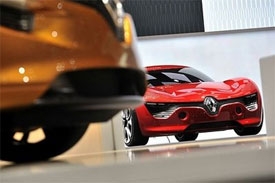Top car markers seek fortune in emerging markets
 |
| illustration photo |
About 700,000 visitors are expected when the show opens between March 3 to 13.
The world's number one car maker Toyota, which has championed cleaner hybrid electric and petrol powered vehicles, signalled further expansion of its range by unveiling a hybrid version of its new Yaris supermini in Geneva.
Didier Leroy, president of Toyota Motor Europe, said the car would be made at its French plant from the second half of the year.
Leroy underlined at the show's press and industry preview that the Japanese company achieved its sales target of 800,000 vehicles in Europe last year.
"Now our goal is to grow by 80 per cent in 2011. We're confident to return to the million plus sales in the near future," he said.
In the nine months to December, Toyota sold more than 910,000 units in China and Asia excluding Japan, a 30 per cent increase as the company brushed off the impact of a technical recall in the United States that dented sales of its flagship Prius hybrid.
Daimler chairman Dieter Zetsche told journalists at the show that hybrid-electric technology would not find its way into the company's luxury Mercedes cars in the absence of demand from its customers.
However, German car group BMW and France's PSA Peugeot Citroen gave the thumbs up to the technology, announcing this week a 100 million euros ($138 million) investment in a joint venture to develop hybrid vehicle technology.
It will include a plant in France and BMW chairman Norbert Reithofer insisted in Geneva that the deal on the less polluting, lower fuel consumption technology was for the "very long term".
"We want to roll out our hybrid systems in the next five to eight years, that means also we're prepared for high oil prices. I also believe that's an intelligent step," said Reithofer.
BMW is eyeing double digit sales growth in January even in top markets the United States and Germany.
Currently half of its business is in the traditional car markets in Europe and North America, and the other half in the rest of the world.
"In China as usual it's going well but also countries like South Korea, Turkey, India, Brazil, Australia, Russia," Reithofer explained.
Daimler's Zetsche called the Chinese market a "safe bet," but like his German rival he played down the sustainability of the huge growth rates seen there in recent years, such as a doubling of sales for Mercedes last year.
"It seems to me that the economy in China will continue for a number of years to grow in the range of the two digits, and on that basis, millions and millions of Chinese people get in the bracket where they can afford a car," he explained.
Nonetheless, "I would not necessarily see further over-proportionate growth in the premium segment," he added.
Reithofer was eyeing more assembly plants in some emerging markets, on top of a new plant in China in 2012 capable of producing 100,000 vehicles a year.
"We must also develop Russia, develop Brazil, we must also look at countries like Turkey for example," he added.
PSA Peugeot Citroen, meanwhile, was happy with keeping its order books as full as last year's in January.
Chairman Philippe Varin said at the show that growth in Europe could be "zero plus".
The French group also sees its fortune in the emerging world, after a good start to 2011 in Russia and China, albeit a step behind the German luxury car makers.
It is awaiting completion of a second joint venture deal in the first quarter in China and scouting India for plant locations.
"There will be a brand of its own and we don't exclude exports from China," Varin said.
What the stars mean:
★ Poor ★ ★ Promising ★★★ Good ★★★★ Very good ★★★★★ Exceptional
 Tag:
Tag:
Related Contents
Latest News
More News
- Russian President congratulates Vietnamese Party leader during phone talks (January 25, 2026 | 09:58)
- Worldwide congratulations underscore confidence in Vietnam’s 14th Party Congress (January 23, 2026 | 09:02)
- Political parties, organisations, int’l friends send congratulations to 14th National Party Congress (January 22, 2026 | 09:33)
- 14th National Party Congress: Japanese media highlight Vietnam’s growth targets (January 21, 2026 | 09:46)
- 14th National Party Congress: Driving force for Vietnam to continue renewal, innovation, breakthroughs (January 21, 2026 | 09:42)
- Vietnam remains spiritual support for progressive forces: Colombian party leader (January 21, 2026 | 08:00)
- Int'l media provides large coverage of 14th National Party Congress's first working day (January 20, 2026 | 09:09)
- Vietnamese firms win top honours at ASEAN Digital Awards (January 16, 2026 | 16:45)
- ASEAN Digital Ministers' Meeting opens in Hanoi (January 15, 2026 | 15:33)
- ASEAN economies move up the global chip value chain (December 09, 2025 | 13:32)






















 Mobile Version
Mobile Version